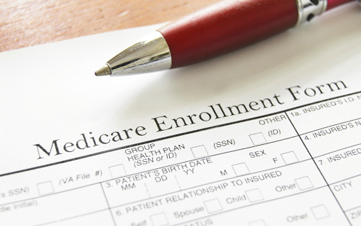6 Ways Retirees Can Cut Health-Care Costs
Medical expenses are likely to be one of your biggest expenses in retirement, and people totally underestimate the cost: Nearly half of the preretirees (ages 55-64) surveyed by Fidelity thought they would need only $50,000 to pay for health care costs in retirement.

Profit and prosper with the best of Kiplinger's advice on investing, taxes, retirement, personal finance and much more. Delivered daily. Enter your email in the box and click Sign Me Up.
You are now subscribed
Your newsletter sign-up was successful
Want to add more newsletters?

Delivered daily
Kiplinger Today
Profit and prosper with the best of Kiplinger's advice on investing, taxes, retirement, personal finance and much more delivered daily. Smart money moves start here.

Sent five days a week
Kiplinger A Step Ahead
Get practical help to make better financial decisions in your everyday life, from spending to savings on top deals.

Delivered daily
Kiplinger Closing Bell
Get today's biggest financial and investing headlines delivered to your inbox every day the U.S. stock market is open.

Sent twice a week
Kiplinger Adviser Intel
Financial pros across the country share best practices and fresh tactics to preserve and grow your wealth.

Delivered weekly
Kiplinger Tax Tips
Trim your federal and state tax bills with practical tax-planning and tax-cutting strategies.

Sent twice a week
Kiplinger Retirement Tips
Your twice-a-week guide to planning and enjoying a financially secure and richly rewarding retirement

Sent bimonthly.
Kiplinger Adviser Angle
Insights for advisers, wealth managers and other financial professionals.

Sent twice a week
Kiplinger Investing Weekly
Your twice-a-week roundup of promising stocks, funds, companies and industries you should consider, ones you should avoid, and why.

Sent weekly for six weeks
Kiplinger Invest for Retirement
Your step-by-step six-part series on how to invest for retirement, from devising a successful strategy to exactly which investments to choose.
Medical expenses are likely to be one of your biggest expenses in retirement, and people totally underestimate the cost: Nearly half of the preretirees (ages 55-64) surveyed by Fidelity thought they would need only $50,000 to pay for health care costs in retirement. But Fidelity estimates that the average 65-year-old couple retiring in 2013 will need $220,000 to cover their health care expenses throughout their lifetimes—not counting potential long-term-care costs. The largest portion of that total is from co-payments, deductibles and excluded benefits, followed by the cost of Medicare Part B and Part D premiums and out-of-pocket costs for prescription drugs. Here are six ways to prepare for and reduce health-care expenses.

Reduce Drug Costs
About one-fourth of retiree health care expenses are for out-of-pocket prescription-drug costs, according to Fidelity. You can save a lot of money by switching from brand-name to generic drugs. That lowers your co-payments and minimizes the effect of the notorious doughnut hole -- the portion of prescription-drug costs Medicare Part D forces you to cover out of pocket. When your prescription-drug costs reach $2,970 in 2013 (including your share and the insurer's share), you have to pay for the prescriptions yourself until your total out-of-pocket cost reaches $4,750 for the year. (In 2013, you get a 52.5% discount on brand-name drugs and a 21% discount on generic drugs in the doughnut hole.)
Ask your doctor if your drugs have a generic alternative, and use the AARP Doughnut Hole Calculator to see if any other drugs are therapeutically similar but have lower costs or better coverage under your prescription-drug plan.

Find the Best Medicare Plan
Even if you've been happy with your coverage through Medicare Part D or an all-in-one Medicare Advantage plan, check out your options every year. Many plans have been raising premiums, boosting out-of-pocket costs and restricting coverage networks (for doctors, hospitals and pharmacies), and the plan that cost the least in the past may no longer be your best deal. You generally can change these plans only during open-enrollment season (from October 15 to December 7 for the next calendar year), but you can switch to a Medicare Advantage plan with a five-star rating anytime during the year (if you're in one of the few areas to have such a plan; see Some Can Switch Medicare Advantage Plans Mid-Year). See our Navigating Medicare special report and The Best Resource for Comparing Medicare Plans for more information about picking a plan.
It can also help to review your options if you have a medigap policy (there's no open-enrollment season for this type of coverage). Some newer medigap plans have lower premiums in return for more cost sharing. Or you may want to consider switching to a Medicare Advantage plan, which provides both medical and prescription-drug coverage from a private insurer, and may also include some vision, dental and hearing-care coverage. See How to Get a Better Deal on a Medigap Policy and How to Compare Medicare Advantage Plans.

Become a Better Health Care Shopper
As more people have to pay a larger portion of the costs from their own pockets—especially for Medicare Advantage plans and newer medigap plans with more cost sharing—it helps to understand how much doctors' visits and procedures actually cost. If you have a Medicare Advantage plan, be sure all of your providers are in-network, and find out if you can save more money by using preferred in-network providers, which may have even lower co-pays. More Part D prescription-drug plans are offering special deals for using preferred pharmacy networks.
Use tools available from your insurer to search for preferred pharmacies and providers. Some Medicare Advantage plans even offer tools to help you compare prices for medical procedures and care in your area. An MRI at an independent radiology facility may cost half the price of the same test at a hospital, for example. You can look up general prices for surgery, hospital stays, doctor visits and medical tests in your area at Healthcare Blue Book.

Take Advantage of Free Preventive Benefits
The health care law now requires most health plans—including Medicare—to provide a variety of preventive-care benefits without charging a deductible, fees or co-payments. Medicare beneficiaries get a "Welcome to Medicare" exam when they first enroll in Part B and are entitled to a personalized prevention plan and annual wellness visit without any cost sharing. Depending on your age, you may also get 100% coverage for screenings for cervical cancer, colorectal cancer and high cholesterol; flu shots, pneumonia shots and the Hepatitis B shot; mammograms for women; and certain kinds of prostate screenings for men. See the Preventive Services page at Medicare.gov and Your Guide to Medicare's Preventive Services for a full list of covered services.

Have a Plan for Long-Term-Care Costs
That $220,000 in medical expenses in retirement doesn't include a potentially huge cost: long-term care. The median cost of a private room in a nursing home is now $83,950 per year, according to Genworth's Cost of Care Survey (see How to Keep Long-Term Costs Under Control). The average 65-year-old will need some kind of long-term care for about three years, bringing the total nursing-home cost to more than $250,000 in today's dollars. Medicare covers very little—only custodial care for a very short time if you need skilled care, too—and Medicaid kicks in only after you've spent most of your money.
A long-term-care insurance policy can cover these costs, but the policies have been getting more expensive and more difficult to qualify for. See A New Strategy for Paying for Long-Term Care for the best ways to cover these expenses now. Also see our Special Report on Long-Term Care and LongTermCare.gov for long-term-care statistics and more information about your options.

Build a Tax-Free Stash of Savings
A health savings account can be a great source of tax-free money for out-of-pocket medical expenses in retirement. Even though you can no longer contribute to an HSA after you sign up for Medicare, you can accumulate funds in an HSA years in advance and use the money tax-free for out-of-pocket health care costs, including your premiums for Part B, Part D, Medicare Advantage and even long-term-care insurance. If you have a high-deductible health insurance policy (at least a $1,250 deductible for individual coverage or $2,500 for family coverage in 2013), you can make pretax (or tax-deductible) contributions of $3,250 for individual coverage or $6,450 for family coverage to a health savings account in 2013. See Smart Strategies for Health Savings Accounts and FAQs About Health Savings Accounts.

Profit and prosper with the best of Kiplinger's advice on investing, taxes, retirement, personal finance and much more. Delivered daily. Enter your email in the box and click Sign Me Up.

As the "Ask Kim" columnist for Kiplinger's Personal Finance, Lankford receives hundreds of personal finance questions from readers every month. She is the author of Rescue Your Financial Life (McGraw-Hill, 2003), The Insurance Maze: How You Can Save Money on Insurance -- and Still Get the Coverage You Need (Kaplan, 2006), Kiplinger's Ask Kim for Money Smart Solutions (Kaplan, 2007) and The Kiplinger/BBB Personal Finance Guide for Military Families. She is frequently featured as a financial expert on television and radio, including NBC's Today Show, CNN, CNBC and National Public Radio.
-
 Dow Leads in Mixed Session on Amgen Earnings: Stock Market Today
Dow Leads in Mixed Session on Amgen Earnings: Stock Market TodayThe rest of Wall Street struggled as Advanced Micro Devices earnings caused a chip-stock sell-off.
-
 How to Watch the 2026 Winter Olympics Without Overpaying
How to Watch the 2026 Winter Olympics Without OverpayingHere’s how to stream the 2026 Winter Olympics live, including low-cost viewing options, Peacock access and ways to catch your favorite athletes and events from anywhere.
-
 Here’s How to Stream the Super Bowl for Less
Here’s How to Stream the Super Bowl for LessWe'll show you the least expensive ways to stream football's biggest event.
-
 States That Tax Social Security Benefits in 2026
States That Tax Social Security Benefits in 2026Retirement Tax Not all retirees who live in states that tax Social Security benefits have to pay state income taxes. Will your benefits be taxed?
-
 What to Do With Your Tax Refund: 6 Ways to Bring Growth
What to Do With Your Tax Refund: 6 Ways to Bring GrowthUse your 2024 tax refund to boost short-term or long-term financial goals by putting it in one of these six places.
-
 What Does Medicare Not Cover? Eight Things You Should Know
What Does Medicare Not Cover? Eight Things You Should KnowMedicare Part A and Part B leave gaps in your healthcare coverage. But Medicare Advantage has problems, too.
-
 12 Great Places to Retire in the Midwest
12 Great Places to Retire in the MidwestPlaces to live Here are our retirement picks in the 12 midwestern states.
-
 15 Cheapest Small Towns to Live In
15 Cheapest Small Towns to Live InThe cheapest small towns might not be for everyone, but their charms can make them the best places to live for plenty of folks.
-
 15 Reasons You'll Regret an RV in Retirement
15 Reasons You'll Regret an RV in RetirementMaking Your Money Last Here's why you might regret an RV in retirement. RV-savvy retirees talk about the downsides of spending retirement in a motorhome, travel trailer, fifth wheel, or other recreational vehicle.
-
 The 24 Cheapest Places To Retire in the US
The 24 Cheapest Places To Retire in the USWhen you're trying to balance a fixed income with an enjoyable retirement, the cost of living is a crucial factor to consider. Is your city the best?
-
 The Six Best Places to Retire in New England
The Six Best Places to Retire in New Englandplaces to live Thinking about a move to New England for retirement? Here are the best places to land for quality of life, affordability and other criteria.
